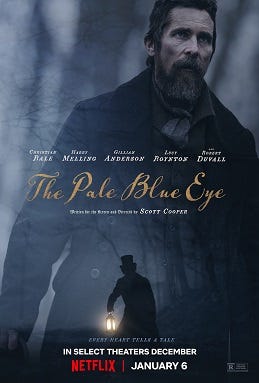The best response I’ve seen to a mystery film was L.A. Confidential. In the theatre, the entire crowd let out a gasp when the killer revealed themself. I won’t spoil it, but it’s a great scene that turns instantly and unexpectedly, and yet seems inevitable. A hard thing to do.
Mystery films often sabotage themselves by their very construction. A film’s structure, the way it metes out screen time to suspects, what the camera lingers on (and what it doesn’t), can all work against the solution remaining a surprise.
This is especially true with casting. Who’s the killer going to be—one of the no-name actors, or the recognizable star? Watch any episode of CSI, and if the suspects are six unknowns and Uncle Phil from The Fresh Prince, odds are Uncle Phil did it.
Good mysteries take this into account, and bad ones don’t, which is why so few are actually mysterious.
The premise of The Pale Blue Eye, written and directed by Scott Cooper and based on the novel by Louis Bayard, could be “The Adventures of Young Edgar Allan Poe.” The film stars Harry Melling as Poe and Christian Bale as his mentor Augustus Landor, with nice character work from Gillian Anderson and Timothy Spall among others.
Not everything works, but the conceit of Poe-as-detective-in-training does; most importantly, the mystery works.
In the morgue at West Point Military Academy, the body of a cadet who died by hanging is found mutilated, his heart cut out. Did the cadet hang himself, or was it murder, and why remove the heart?
It falls to Landor, an alcoholic former detective exiled from his profession by grief over a missing daughter, to find the culprit and preserve West Point’s honor. Landor enlists Cadet Poe to assist with the investigation, serving as his trainee and spying on his peers at the academy.
Landor and Poe soon learn the dead cadet was murdered, the heart taken for occult purposes (which is pretty much the only reason someone steals a heart, other than science, or hunger I guess).
Poe is precocious, genteel, an odd specimen to find at a military academy. He’s unloved by his fellow cadets but insinuates his way into their good graces, ferreting back information about the night of the murder. When a second cadet is killed, and Poe falls in love with the sister of one of the suspects, it’s up to Landor to come to his rescue.
The Pale Blue Eye anticipates the likely guesses to the mystery, and includes enough recognizable characters actors—Anderson and Spall, Toby Jones and Robert Duvall—to create a field of convincing suspects. Out of familiar and pedestrian elements, it crafts a solution I didn’t see coming, in a way I didn’t see coming.
The acting is solid—my favorite Bale performance is The Prestige, and he’d oddly suited to period films. Melling’s Poe looks the part, gets a few laughs at being gloomy and poetic, but never falls into caricature. Spall and Anderson are dependably great. Visually, the film looks better than most Netflix offerings.
The reviews for The Pale Blue Eye weren’t particularly kind. An alcoholic detective with what my partner calls “man pain,” a pair of mismatched partners, a serial murderer, sexual violence, and a whiff of the occult—these aren’t new elements, and the combination doesn’t break acres of new ground.
But as a mystery and a historical adventure, Pale Blue Eye over-delivers. A severed thumb’s up.
What did you think?






Melling and Bale were great. I expected something different (i.e., Bale playing Poe), but it was really good. Nice twist. Great cinematography.
Loved it! Melling is quickly becoming a favorite.